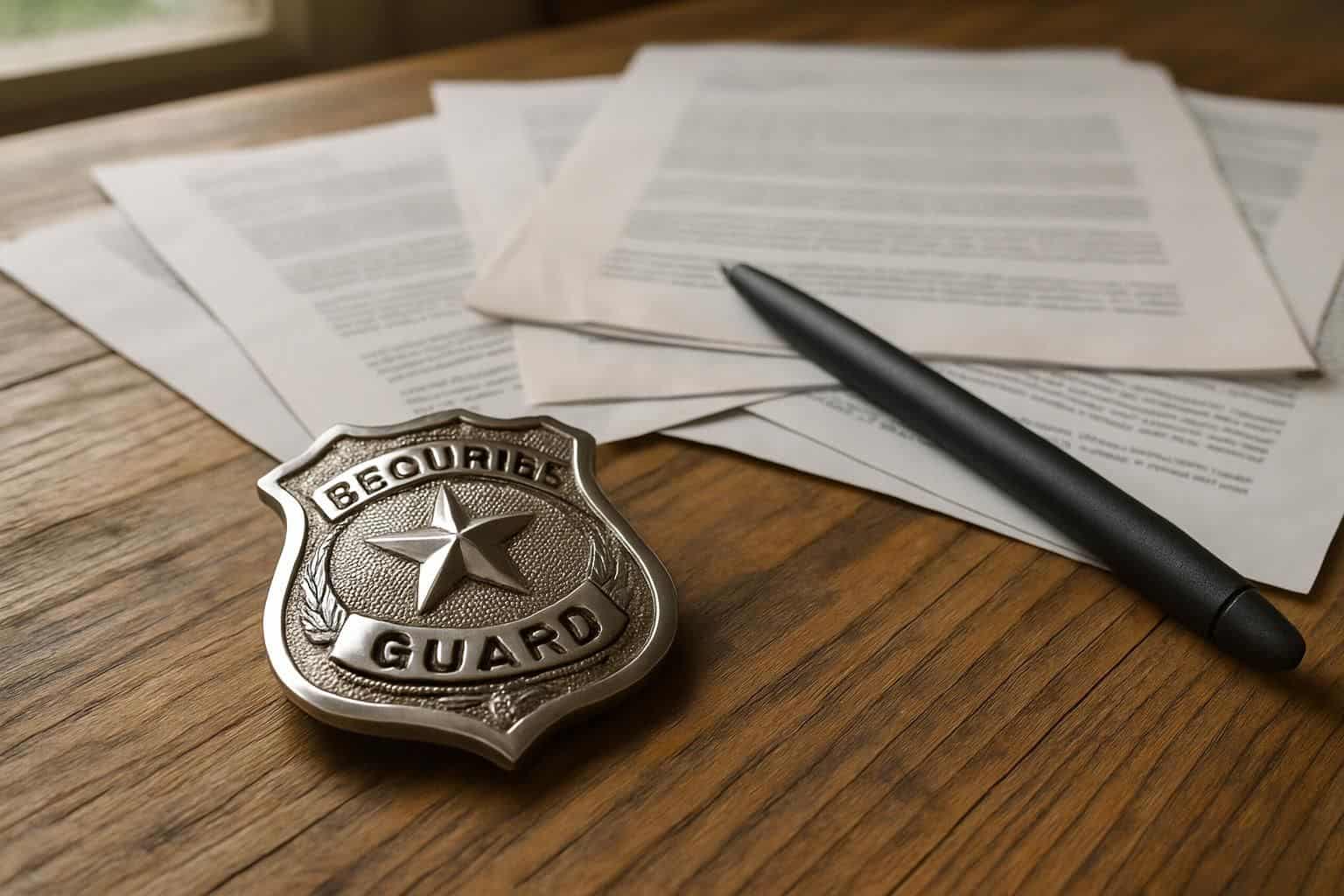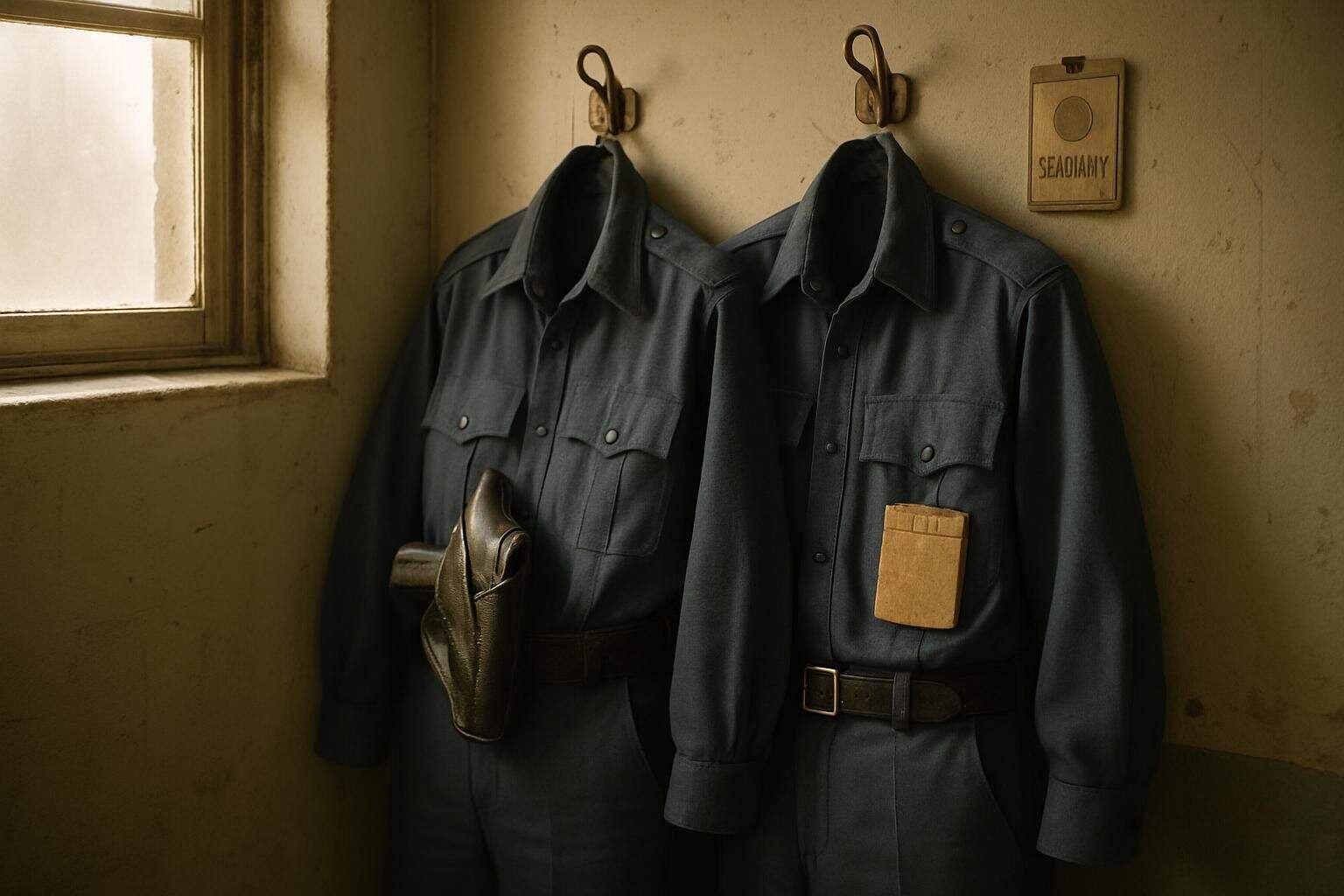Looking for a career that lets you protect others and feel proud of your work? Security guards make around $36,052 each year on average in the United States. This guide shows you exactly how to become a security guard, with seven easy steps from training through licensing.
Read on to find out if this rewarding job is right for you.
Key Takeaways
Security guards in the U.S. typically make around $36,052 each year, while armed officers average approximately $46,840 annually.
You need to be at least 18 years old, hold a high school diploma, and successfully pass a criminal background check.
Good communication skills, physical fitness, and a sharp eye for detail are key to doing well in security roles.
Each state sets its own rules for training and licensing—most require you to renew your license every one to two years.
Job openings in security should grow by about 15% by 2030, creating plenty of opportunities for growth and special training programs.
Table of Contents
Basic Requirements to Become a Security Guard
Security guard jobs have clear entry points that anyone can meet with some effort. You need to check the basic boxes first before you can start your training and move forward in this career path.
Age and Education
Most security guard roles require you to be at least 18 years old. You’ll also need a high school diploma or GED to qualify for entry-level positions. In Ontario specifically, a high school diploma is mandatory for all security jobs.
Your education confirms you’re ready to handle tasks like writing reports and solving problems on the job.
Many women choose a security career because it provides steady hours and decent pay without the need for college education. Your driver’s license and proof of ID will be important parts of your application.
A clear criminal record is another requirement, since the job involves trust and responsibility.
Next up, you’ll learn about the background check you’ll go through as you complete security license course today.
Background Check
Aside from meeting age and education requirements, you’ll need a clean background for security jobs. Every security guard position involves a criminal background check to confirm you don’t have serious offenses.
Years ago, I applied for a security role and found the screening surprisingly thorough. They reviewed my whole history—going way back, beyond recent years alone. The process includes criminal record searches at local, state, and federal levels.
Certain security positions even require fingerprint checks and driving record evaluations, confirming who you are and how responsibly you drive.
Drug testing is another common requirement in security jobs. Employers prefer guards who keep alert and make sound decisions on duty. Security officers undergo periodic screenings throughout their careers, ensuring standards remain high.
Background checks might seem intense—but they’re critical for protecting the public and the properties you’re guarding. Women usually find the process simple, especially if they gather identity documents like their birth certificate, ID card, and similar paperwork ahead of time.
Developing Essential Skills

Security work demands a strong set of core abilities that set you apart from others. You need to master skills like clear speaking, staying alert, and quick thinking to succeed in this field.
Communication Skills
Clear communication skills provide the foundation for effective security work. As a female security officer, mastering verbal skills lets you deliver clear orders quickly in emergencies, cutting confusion right away.
I saw this myself while doing retail security—my calm, steady voice helped defuse a shoplifting situation peacefully. Non-verbal signals count, too; standing tall and making direct eye contact projects authority and strength.
Good writing skills also matter, helping you draft accurate incident reports that could later serve as legal records.
Effective de-escalation methods can help you avoid many difficult moments on duty. Staying calm, patient, and showing understanding often turns a tense exchange into something you can easily control.
Women often have a natural advantage in reading emotional signals, making us extra effective working security posts. Practicing clear speaking and active listening every day will sharpen these valuable skills.
Clearly passing accurate information during conflicts keeps everyone on-site safe and secure.
Physical Fitness
Strong communication helps you manage interactions easily, but physical fitness gets your body ready for security tasks. Guards frequently stand for long hours during shifts, sometimes lifting heavy equipment or objects.
You need both strength and stamina—enough to stay energized without quickly tiring out.
Physical fitness isn’t just about looking strong; it’s about being ready when strength matters most.
Fitness counts just as much for women guards as it does for men. Regular workouts that blend cardio and strength exercises keep you ready for the job’s physical requirements. Many private security firms test applicants’ fitness levels before hiring them—unlike most police departments, which rarely require fitness tests after recruitment.
Research suggests fit guards perform better at their tasks and experience fewer workplace injuries. Starting a simple routine—like walking daily, doing basic strength moves, and stretching—will prepare you physically for security duties.
Observation and Attention to Detail
Security work involves far more than being physically fit—it requires sharp observational skills. You need eyes that notice what others overlook. An effective guard spots the small signs of trouble before it becomes obvious.
My first week patrolling a shopping mall taught me this firsthand. A man was repeatedly circling the jewelry store—glancing at his watch, checking exits, and acting anxious. Paying attention to these strange behaviors allowed me to stop a robbery before it began.
Good observation involves seeing slight changes in the environment around you. It means noticing unusual activity while staying focused throughout long shifts. After an incident happens, detailed notes make for clear, accurate reports.
Many security problems remain minor if caught early through careful observation. Employers appreciate guards who catch potential trouble before it escalates. Attention to detail also matters when checking identification, watching surveillance screens, and spotting issues such as drinking on the job or breaking company rules.
Being alert and observant keeps everyone around you safer.
Training and Certification

Training programs teach you the core skills needed for security work. You’ll need to get certified through state-approved courses that cover laws, emergency response, and safety protocols.
Basic Security Guard Training
Basic Security Guard Training sets the stage for your career in security. It covers crucial topics like legal responsibilities, handling emergencies, and clear communication. Too many guards miss out on thorough training, leading to serious errors at work.
https://www.youtube.com/watch?v=ojt07myGosw
I knew a guard who made costly mistakes during an incident at the mall because she never learned key procedures. Effective training blends traditional methods with modern technology—things like video surveillance and digital reporting software.
Proper training doesn’t just build skills, it builds confidence when facing real-world security challenges.
Advanced security training can unlock doors to specialized jobs with better pay and more career opportunities. Now, let’s check out some of these specialized security roles.
Advanced Training for Specialized Roles
Once you finish basic training, special courses can help you advance your security career. Crisis Prevention and Intervention training gives you clear ways to ease tense situations—helping you calm things down before trouble starts.
Last year, I took this course myself, and now I feel much calmer and more confident talking with upset or stressed individuals.
Another popular option is the Security Supervisor Certification course. It teaches you how to lead a team, develop safety strategies, and create detailed security plans—a great step if you want to reach a management role someday.
Active Shooter Response Training gives you strong skills that employers truly value. It covers quickly spotting threats, lockdown drills, and clear response steps to handle dangerous emergencies.
Executive Protection can also be an attractive career path, especially for women. This role involves guarding high-risk clients like executives or VIPs and typically pays better than regular security guard jobs.
These special qualifications can boost your earning power and give you access to more job opportunities. Sure, each course will cost some money upfront—but it quickly pays back with better positions and higher paychecks in security roles.
Licensing Process

The licensing process marks a key step in your security guard career path. You must meet state rules and pay fees to get your official permit to work.
State-specific Licensing Requirements
Each state sets its own rules for security guard licenses. In California, you’ll need to finish 40 hours of training to earn your guard card. Florida is slightly tougher, requiring 42 hours of classes for unarmed guards—I discovered that first-hand while helping my friend apply there last year.
All states will check your criminal history, so staying clean matters. Working without the right license can land you with fines or suspension.
In Texas, expect about two months for paperwork processing and license approval. Washington state keeps it straightforward, requiring an annual renewal with a modest fee and a quick check that you’ve maintained a clean record.
Research your state’s specific rules carefully before applying—I learned the importance of that step while assisting my buddy.
Renewal of License
State rules outline how to obtain your security license—but keeping it current matters just as much. Renewing your license on time helps you maintain steady employment without breaks.
In Texas, a security guard license lasts two years; the renewal fee runs around $40. New York offers an easy-to-use Security Guard Renewal Request Form if you’re eligible. Most states ask you to renew your license before the current one expires, so planning ahead is crucial.
Washington State has a yearly renewal requirement, charges a small fee, and requests proof of a clean criminal record. Renewals typically involve fingerprint background checks to verify your record remains clear.
One year, I procrastinated until the last minute—rushing paperwork wasn’t fun, trust me—so now I make calendar reminders months in advance. Solid planning reduces stress and helps safeguard your professional status.
Types of Security Guard Roles

Security guard roles vary based on specific job needs and required skills. You can choose between armed positions that need weapons training or unarmed roles that focus more on observation and reporting.
Unarmed Security Guards
Unarmed security guard roles offer a solid first step into safety careers. These jobs typically require a license but rarely demand extensive prior experience, making them ideal for women starting out or switching careers.
Daily duties include protecting properties, enforcing safety guidelines, and assisting anyone needing help. Job prospects look especially bright—the Bureau of Labor Statistics expects a 15% increase in security employment by 2030.
That growth surpasses many other fields, meaning more job opportunities for you.
Entry-level salaries average around $30,000 per year nationally, though pay often varies by location and the hiring organization. Women often use these roles to build practical knowledge in observation techniques, incident reporting, and risk assessment before transitioning into specialized careers.
You’ll gain valuable personal skills like clear communication and effective problem-solving and learn foundational security practices. Many employers even provide basic first aid training—another useful qualification to enhance your resume.
In comparison, armed security guard jobs require extra instruction, certifications, and specialized skills.
The best security guards don’t just watch for trouble—they prevent it through awareness, preparation, and presence.
Armed Security Guards
Armed security guards carry firearms and need special training beyond basic guard duties. I spent three years working as an armed guard, and let me tell you—it takes real skill to handle weapons safely.
Specialized training includes firearm safety, correct handling techniques, and understanding the legal use of force in various situations. Guards also practice frequently at shooting ranges, passing tests to show weapon proficiency and competence.
In the United States, armed guards earn a median salary of $46,840 per year, making it an attractive career path within the security field.
This type of role comes with increased responsibilities, often protecting valuable assets or handling riskier environments. Keeping yourself mentally sharp and calm becomes essential during stressful moments.
Most states require armed guards to be at least 21 years old and pass detailed background checks before receiving their license. With an armed guard background, your future career path could include positions in personal protection or specialized areas—opening doors to even more exciting and rewarding security work.
Personal Protection Officers
Personal Protection Officers serve as bodyguards for individuals needing extra safety measures. These professionals require advanced training compared to regular security guards—they protect people, not just buildings or property.
In fact, most states ask for special permits beyond typical security licenses for this kind of work. I’ve personally collaborated with several female bodyguards who stood out due to their excellent communication skills.
Women often excel in this role, as clients generally feel more relaxed having them close by.
This job calls for sharp eyes and speedy reactions during risky moments. You’ll need to become skilled in spotting risks early and solving problems on the fly. Many employers also favor candidates who have some background in criminal justice.
Duties require constant alertness, but staying professional is just as crucial. Daily tasks might involve scanning surroundings for threats, choosing safe routes for travel, or quickly managing medical issues if they pop up.
Career Advancement Opportunities
From specialized training to leadership positions, your security career can grow beyond entry-level roles—read on to discover how to climb the ladder in this growing field.
Specialized Certifications
Earning specialized certifications can boost your security career and increase your earning potential. Crisis Prevention and Intervention training helps you manage tense situations calmly—before they turn explosive.
This skill becomes especially useful in retail environments; I’ve personally watched guards calm down angry customers to avoid serious conflicts. Getting an Executive Protection Certification gives you access to better-paying roles protecting VIPs and business leaders.
Many women thrive in executive protection roles because of their sharp observation abilities and strong attention to detail. TASER training teaches you how to handle the device safely and offers strategies for reducing conflicts, opening up more job opportunities.
Employers also highly value CPR First Aid training and OSHA certifications, often rewarding certified staff with higher pay. These certifications demonstrate to your employer that you take safety and risk management seriously.
Your career could soon grow into leadership positions, giving you opportunities to use these advanced skills daily.
Leadership Roles in Security
Security pros have clear paths to higher roles—shift supervisors, site managers, or even security directors. Women often thrive in these positions because they show solid work ethics and confidently handle projects.
Companies appreciate your ability to build trust easily and manage a team effectively. Your skills in solving problems and assessing risks make you ideal for leadership roles.
Forming strong connections in your field can help you land better job opportunities. Seek out mentors who can guide you to higher positions. Security companies want leaders who consistently demonstrate integrity.
Experience in retail loss prevention or managing projects gives you a real advantage. Take on extra responsibilities that clearly highlight your skills in leading others through tricky challenges.
How Will the Role of Security Guards Evolve in 2025?
By 2025, security guard roles will look very different. Technology will require guards to pick up new skills—like basic cybersecurity and handling digital monitoring equipment. Women in security roles will benefit from extra training to keep up with these shifts and stay competitive.
Tasks will extend beyond simply guarding buildings; duties such as risk assessments and planning emergency responses will become routine. Client demands are rising, and many companies now expect guards to manage several responsibilities at once.
This widespread shift offers women greater opportunities, particularly through advanced certifications and leadership positions.
Job prospects in the security field look bright, especially in areas like airport safety, retail protection, and large event management. Guards may deal with hazardous materials or learn about insurance claims as part of their broader job duties.
Soft skills such as problem-solving, clear communication, and effective interpersonal interactions will soon become as necessary as physical readiness. Women who bring these strengths, combined with formal training and relevant certifications, will position themselves strongly ahead of these industry shifts.
People Also Ask
What are the basic requirements to become a security guard?
You’ll need a high school diploma or GED, verified identification, and a clean criminal record. Most states also require you to hold a valid driver’s license and pass a thorough background check. You must be a U.S. citizen or permanent resident, with documented proof of legal residency.
Do I need formal educational credentials to work in security?
Formal education beyond high school isn’t usually necessary for entry-level security jobs. Yet certain specialized roles—like security at airports or supervising projects—may ask for extra training or certification. Skills in writing clear reports and solving problems matter more than holding a college degree.
What kind of training is needed for security guard work?
Security guard training typically includes safety and security procedures, emergency response practices, and proper incident reporting. You’ll also cover dealing with medical emergencies and routine patrol methods. Many companies offer on-site training programs, while some may expect completion of online courses through sites like Coursera.
Will my mental health history affect my ability to become a security guard?
Security agencies usually perform thorough background checks, which may include screening for issues related to mental health or substance use—mainly due to liability concerns and the typically stressful nature of security work. Having a record of mental health issues won’t necessarily disqualify you, but openness and honesty about your history during application are essential.
What hard skills are most valuable for security guards?
Valuable skills include clear report writing, basic first aid knowledge, effective surveillance methods, and familiarity with safety guidelines. Being good at quickly addressing unexpected issues is also helpful in managing tense or unusual situations. Certain positions may call for specialized skills—such as operating electronic security equipment or conducting personal safety screenings.
How does personality type affect success in security work?
Personality plays a significant role in doing well as a security guard. Some employers use personality assessments, similar to MBTI, to screen applicants. Creativity isn’t the focus here—companies favor qualities like reliability, attention to detail, and staying calm in stressful moments. Honestly assessing your personality can help you know if security work fits your natural style.
References
https://www.centreforsecurity.com/7-steps-for-becoming-a-security-guard/
https://www.palamerican.com/careers-in-security/how-to-become-a-security-officer/
https://www.buildingsecurity.com/blog/effective-communication-skills-for-security-guards/
https://pmc.ncbi.nlm.nih.gov/articles/PMC9312045/
https://investigativeacademy.com/12-essential-skills-for-security-guards/
https://connecteam.com/security-guard-training-program/ (2024-04-17)
https://www.securityguardtrainingcentral.com/security-guard-training-washington-dc/
https://www.belfrysoftware.com/blog/security-guard-license-requirements-by-state
https://dos.ny.gov/security-guard
https://www.ihiresecurity.com/resourcecenter/jobseeker/pages/how-to-become-a-security-guard
https://www.belfrysoftware.com/blog/security-guards
https://investigativeacademy.com/how-to-become-an-armed-security-guard-training-requirements/
https://www.palamerican.com/careers-in-security/how-to-become-armed-security-guard/ (2024-12-17)
https://investigativeacademy.com/how-to-become-a-security-guard/
https://www.buildingsecurity.com/blog/security-guard-career-path/

